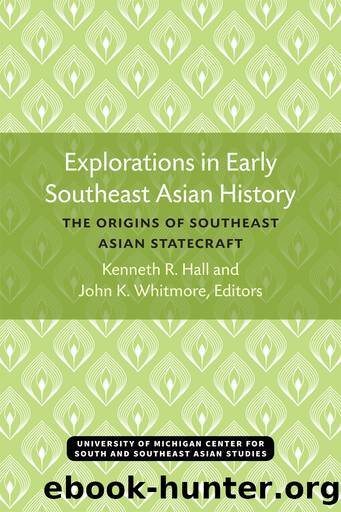Explorations in Early Southeast Asian History: The Origins of Southeast Asian Statecraft by Kenneth R. Hall & John K. Whitmore

Author:Kenneth R. Hall & John K. Whitmore
Language: eng
Format: epub
Publisher: University of Michigan Center for South and Southeast Asian Studies
Published: 2020-01-15T00:00:00+00:00
Note: The Vietnamese Confucian Scholarâs View of His Countryâs Early History*
by John K. Whitmore
The fact that Vietnam was not a thoroughly Confucian state throughout its history leads to the question of how the Confucian literati of later times interpreted and commented upon that earlier part of their history during which the Confucian ideology was not yet dominant. This is also interesting since each of our selected authors lived in a different time regarding the acceptance of the Confucian ideology by the Vietnamese. First of all, there are no known Confucian works for the period of the Confucian Court cult in the eleventh and twelfth centuries. Lê VÄn HÆ°u then wrote his history, the Äại Viá»t Sá» Ký,1 in the thirteenth century when the Confucians existed in a Buddhist environment and had no major policy role at the Court. His was a voice seeking to establish a new doctrine. Ngô SÄ« Liên, on the other hand, compiled his history, the Äại Viá»t Sá» Ký Toà n Thu,2 during the initial triumph of Confucian thought in the fifteenth century for an Emperor strongly imbued with this thought. By the eighteenth century, Ngô ThÄ« SÄ« was writing his private history, the Viá»t Sá» Tiêu Ãn,3 during the time of renaissance when both Vietnamese traditions and Confucian history were being compiled by the literati. And finally the Tá»±-ÄÆ°c Emperor in the following century made his comments in the Khâm Äá»nh Viá»t Sá» Thông Giám CÆ°Æ¡ng Mục4 at the apogee of Confucianism as the ideology of the Vietnamese state and also when its decline had already begun under French pressure.
Patterned on the chronological style of Ssu-ma Kuang, the Vietnamese histories consist of the chronicling, year by year, of the events of the state. Interspersed among the entries are comments by the various historians concerning the nature of the events and actions being recorded. We shall concentrate on these comments in order to understand the views of the Vietnamese historians, particularly those comments dealing with the existance of a non-Confucian Vietnam from the tenth to the fourteenth centuries.
Since there are many comments scattered throughout the Vietnamese histories for these five centuries, particularly by Ngô SÄ« Liên and the Tá»±-Äức Emperor, those comments made about certain key points in the development of the Vietnamese state have been selected for discussion. This will allow us both to see the point of view of the Confucian writer and to examine significant changes in Vietnam.
The style of kingship existing in Vietnam at the end of the tenth century and the beginning of the eleventh was quite foreign to these writers. Both Äinh Bá» LÄ«nh and Lê Hoan had five queens, and each had married the main queen of his predecessor. These rulers tended to honor just their parents rather than their paternal lines, and their posthumous names were both carried over from their living titles. The first Lý ruler, Lý Công Uẩn, in turn continued a number of these patterns. Comprehension of these actions was difficult for our writers. Lê VÄn HÆ°u, the closest in time, could not or would not tolerate such behavior.
Download
This site does not store any files on its server. We only index and link to content provided by other sites. Please contact the content providers to delete copyright contents if any and email us, we'll remove relevant links or contents immediately.
| Africa | Americas |
| Arctic & Antarctica | Asia |
| Australia & Oceania | Europe |
| Middle East | Russia |
| United States | World |
| Ancient Civilizations | Military |
| Historical Study & Educational Resources |
The Story of China by Michael Wood(961)
Mr. Selden's Map of China by Timothy Brook(811)
Philippines--Culture Smart! by Culture Smart!(712)
Heroic Hindu Resistance To Muslim Invaders (636 AD to 1206 AD) by Sita Ram Goel(693)
Akbar: The Great Mughal by Ira Mukhoty(673)
First Platoon by Annie Jacobsen(664)
Vedic Physics: Scientific Origin of Hinduism by Raja Ram Mohan Roy(663)
The Meaning of India by Raja Rao(662)
Food of India by unknow(661)
Banaras by Diana L. Eck(653)
India--Culture Smart! by Becky Stephen(629)
China Unbound by Joanna Chiu(628)
North of South by Shiva Naipaul(626)
Mao's Great Famine: The History of China's Most Devastating Catastrophe, 1958-1962 by Frank Dikötter(619)
Insurgency and Counterinsurgency by Jeremy Black(597)
The Genius of China: 3,000 Years of Science, Discovery, and Invention by Robert Temple(594)
A History of Japan by R.H.P. Mason & J.G. Caiger(588)
How to Be a Modern Samurai by Antony Cummins(587)
The Digital Silk Road by Jonathan E. Hillman(581)
